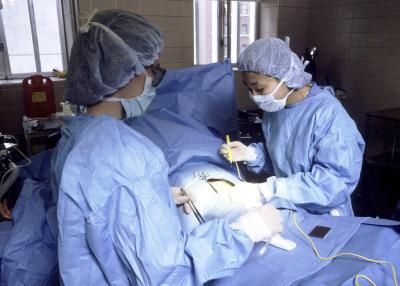A cesarean section, also called a C-section, is the delivery of a baby through surgery. The surgeon makes a cut across the belly to deliver the baby when a vaginal birth is unsafe for the mother or child. C-sections are safe, but certain risks are associated with the procedure that are not present with vaginal delivery.
Complications for Baby
Babies born by C-section have an increased risk for breathing problems. During the first few days after birth, C-section babies can develop abnormally fast breathing. Elective C-sections, performed before 39 weeks, may increase the chances of your baby developing other types of breathing problems, such as respiratory distress syndrome, if the baby’s lungs have not matured enough by the time you have the C-section. A rare complication for the baby is the doctor accidentally nicking the baby’s skin during the surgery.
Complications for Mom
The membrane lining your uterus could become infected, causing fever, chills, back pain and a foul-smelling vaginal discharge. You may also get an infection around the incision. You may hemorrhage, or you may develop a blood clot in your legs or pelvic area. You may develop a urinary tract infection. You may experience constipation. You may have a negative feeling about your birth experience and have trouble with initial bonding with your baby, according to the American Pregnancy Association.
Wound Complications
If you weigh more than 199 lbs., you have a 25 percent chance of having a wound complication associated with your C-section, according to the National Institutes of Health. As of 2009, doctors were experimenting with using a vacuum method of wound suction, in addition to the standard stitching and stapling, to reduce the scarring complications.
Recovery
After a C-section, you normally stay in the hospital two to five days. It takes you longer to recover from a C-section than it does for a vaginal delivery. Some women need weeks or even months to recover from the C-section. You might find it painful to walk, but you are encouraged to do so the day of your surgery. You might experience pain.
Future Pregnancies
Once you have a C-section, you may not be able to have a vaginal delivery in the future. You also are at increased risk of problems with the placenta, abnormal fetal positions and tearing of the uterus in future pregnancies.





